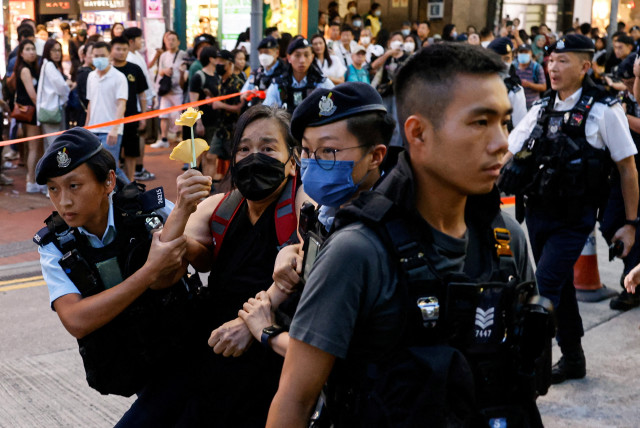‘Art College 1994’ features more talk than paint - review

It focuses on two guys, Zhifei a.k.a. Rabbit (Shaoxing) and Xiaojun (Dong Zijian), gifted students at a provincial art college, who are trying to figure out art, life, women, and everything else.
"Since anything can be a work of art, anyone can be an artist,” is one of the many lines students utter as they debate the value of studying art in the animated movie Art College 1994, which opened in theaters around Israel on Thursday.
Directed by Liu Jian, Art College 1994 is less like a movie and more like a graphic novel where someone else turns the pages for you. The visual style of the movie is stunning, which makes sense given its subject. There is little movement in each scene, and you have to watch carefully to see which character’s mouth is moving at any given time. It’s semi-realistic looking, but each frame is composed artfully, and objects are foregrounded or glimpsed fleetingly to set the mood.
It focuses mainly on two guys, Zhifei a.k.a. Rabbit (Shaoxing) and Xiaojun (Dong Zijian), gifted students at a provincial art college, who are trying to figure out art, life, women, and just about everything else. Xiaojun is the more hipster-ish of the two, while Rabbit is a nerd and marginally more practical. In most ways, they could be art students anywhere in the world, at any time, but because it’s the 1990s, they trade cassettes and Xiaojun worships Kurt Cobain. A Godfather revival is a must-attend event.
There are girls, too, but they are music students: Hao Lili (Zhuo Dongyu), a disciplined young pianist who is nevertheless tempted by a rich guy who wants to take her around the world, and Gao Hong (Papi), who is more interested in her hairstyle and singing at a bar than about her studies.
There are a few plot threads, the most interesting of which concerns a friend, Youcai (Huang Bo), an aspiring artist who can’t get into their college but hangs around anyway, and when he seems to be having a psychotic break, his friends are convinced that it’s all performance art. There’s another one about a traditional canvas the two have collaborated on that another student destroys, for murky reasons. Xiaojun and Lili have a moment, but then her thoughts turn back to the boring rich guy.
But the bulk of the nearly two-hour movie features Rabbit and Xiaojun talking, mostly about art, which is probably quite realistic for a story set in an art college. Interestingly, we rarely see them painting, but we hear, over and over, their ideas about art. As they see a guy lying in bed at an exhibit, they realize it’s installation art, and Rabbit quips, “Then our dorm room is full of installation art.” In another moment, reminiscent of the famous scene in the opera La Boheme, two characters burn their art, but then one runs back home to get his camera to document the moment.
Much of their talk focuses on the age-old question of selling out or not selling out, of making art that will be popular versus art that expresses their souls. Youcai asks Xiaojun, “If you can’t eat, how can you make art?” The latter replies, “On the contrary, artists should be poor, like Van Gogh, Modigliani, they were all poor. Poverty makes you suffer, suffering brings passion, and with passion, great art can be created.”
Another idea Xiaojun brings up frequently is that the world is changing and art must change with it, which Rabbit resolutely dismisses. The 1990s were a period when China was transitioning to a more capitalist economy, following the student protests in Tiananmen Square in 1989, an event that is not referenced here. I don’t know enough about China to know whether the aftermath of this protest movement would have had an impact on these art students.
This reminds me of a comment that many reviewers abroad made about Talya Lavie’s Zero Motivation, a movie about female soldiers on a Negev base who are miserable there. The reviewers asked how it was possible that they never discussed politics, and Lavie responded in interviews that the movie was inspired by her army experiences and that she and her fellow soldiers talked about getting transferred to Tel Aviv and breaking video game records on the office computers, but not about the Israeli-Palestinian conflict.
One question kept lingering...
But still, as I watched Art College 1994, the question lingered in my mind. If, in fact, it is realistic that these students would not speak or think about the student protests, which were shut down so brutally, it shows how completely the government won out. The only moment where there is the faintest reference about being an artist in an authoritarian dictatorship is when a professor warns Xiaojun about his disregard for the rules – about painting – telling him, “Being talented doesn’t mean you can do whatever you want. Please keep this in mind.”
One question that is on all their minds is going abroad. When a visiting artist addresses the students, a woman asks him if the moon is more beautiful abroad. She is chided for wondering about that, but the artist tells her that the world outside China is very beautiful. Anyone who has seen Chinese artists selling their wares or doing caricatures on the streets of Western capitals knows that many of the characters will probably end up leaving.
For most, this beautiful-looking talkfest will be too long to hold their interest. It could easily stand to be half an hour shorter. But art students will enjoy the visuals and the debates.
Jerusalem Post Store
`; document.getElementById("linkPremium").innerHTML = cont; var divWithLink = document.getElementById("premium-link"); if (divWithLink !== null && divWithLink !== 'undefined') { divWithLink.style.border = "solid 1px #cb0f3e"; divWithLink.style.textAlign = "center"; divWithLink.style.marginBottom = "15px"; divWithLink.style.marginTop = "15px"; divWithLink.style.width = "100%"; divWithLink.style.backgroundColor = "#122952"; divWithLink.style.color = "#ffffff"; divWithLink.style.lineHeight = "1.5"; } } (function (v, i) { });

